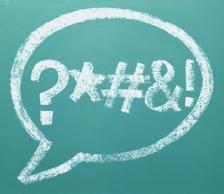Can I Use Profanity in a Speech or Podcast? (Part 1)
Swearing in a podcast or during a speech — does it help get your point across or just alienate your audience? It’s not so simple. The Public Speaker tackles this thorny issue in Part 1 of this series on profanity.

Profanity is a linguistic taboo. Every language has what we call “swear words.” They’re words that are impolite or offensive. Swear words carry an extra weight or stigma when used. They have power. Like all power, profanity can be used for good or evil.
Sponsor: Want to save more, invest for the future, but don’t have time to be a full-on investor? Betterment.com helps you build a customized, low-cost portfolio that suits your goals. Sign up at betterment publicspeaker and receive a $25 bonus when you make a deposit of $250 or more.
Before I had kids, I remember spending an evening watching a movie at home with a friend. Her 2-year-old son was in the room with us. Because he was so young we didn’t think too much about the language in the movie. But as the night went on, I noticed something. Every time someone used profanity in the movie, her son looked up at the TV. It happened several times. This child wasn’t being raised around profanity. I doubt he had ever heard the “F” word in his life. I believe the words caught his attention because of the emotion and weight given to them by the speakers.
But back to our question. Is it ever ok to use profanity in a podcast or speech? Let’s look at some factors that will help you decide.
Question #1: Is profanity part of who you are?

“Swearing: because sometimes ‘gosh darn it’ and ‘meanie-head’ just don’t cover it.”
Profanity really doesn’t offend me. But it’s not my method of communication. It would be strange to my audience if I suddenly started peppering my talks with swear words.
I typically advise people to be authentic and true to who they really are. If profanity is the way you express yourself (or is part of your brand) then leaving it out or replacing it with slang might not be authentic. If you do choose to use profanity, do it in a purposeful way. Carefully choose swear words in an effort to be emotional and evocative. There are a few bloggers, podcasters, and speakers who do this well. We’ll talk more about them in part two of this series.
Question #2: Will your audience be offended?
When speaking to business colleagues or in a community setting, I nearly always advise not to use profanity. You can almost always communicate more clearly and effectively if you choose words that have more specific meanings. So if you are just being lazy with your word choice and are choosing swear words for emphasis because it’s easier than actually coming up with precise language, then it’s best to leave them out. Often swear words will alienate some portion of your audience and if they’re not necessary, why risk it?
Research does show that there are regional differences when it comes to profanity. For example, people from Boston and New York tend to swear more casually and frequently then people from say Idaho. A surprising recent study on regional differences in the frequency of swearing concluded that the state of Ohio wins for the most profanity. Research showed Ohioans using profanity once in every 150 conversations. The state of Washington was the lowest with one profane word in every 300 conversations. The bottom line is this: If you’re speaking in a region you’re not intimately familiar with, the safest rule is to avoid swearing.
Obviously, if you’re speaking in front of an audience that includes children, you wouldn’t swear. Church audiences and PTA meetings should be profanity-free too.
Question #3: Is using profanity worth the potential backlash?

You might think that football coaches would be given a free pass on profanity. Sports and swearing go together like pizza and beer. But one football coach lost his job over a profanity-laced motivational speech that was leaked online. When I watched the speech I saw a frustrated coach trying to find some way to get through to his team. But his superiors saw it differently and he was terminated from his coaching position.
Interestingly, an informal Huffington Post survey recently addressed the situation, asking voters, “Should Abel have been removed from his coaching position?” and just about 60% responded with “No, it’s not bad enough for a firing.” while a little over 30% responded with “Definitely, that speech is completely inappropriate.”
Whenever you use profanity in public speaking, you risk a backlash. You risk not being asked back to the conference next year. You risk being replaced by someone deemed less offensive. You risk alienating your audience. Think about whether it’s worth it before you choose to include profanity.
Back to my “it depends” answer. The vast majority of the time I would say don’t do it. Find clearer, less offensive ways to make your point. But there are times when profanity is an effective way to get your message out. The intensity and emotion that generally come with profanity can be very persuasive.
Join me for the second part of this podcast series next time when we’ll look at examples of when including profanity in speech (or podcast) might be the right choice.
This is Lisa B. Marshall, helping you maximize sales, manage perceptions, and enhance leadership through keynotes, workshops, books, and online courses. Passionate about communication; your success is my business.

Listen to Smart Talk: Inspiring Conversation with Exceptional People by visiting smarttalksuccess.com.
Swear words and shocked audience images courtesy of Shutterstock.






